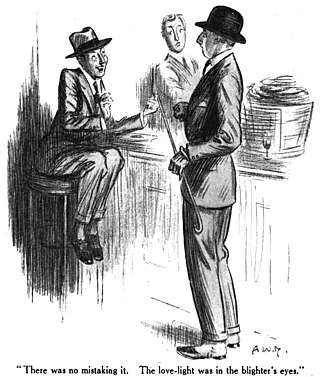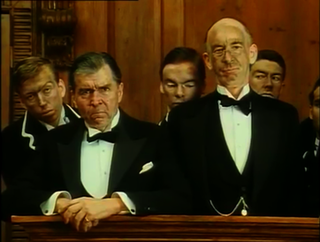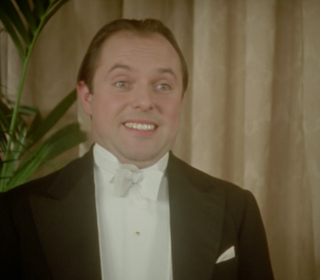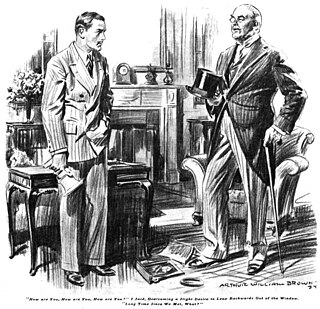
Jeeves is a fictional character in a series of comedic short stories and novels by English author P. G. Wodehouse. Jeeves is the highly competent valet of a wealthy and idle young Londoner named Bertie Wooster. First appearing in print in 1915, Jeeves continued to feature in Wodehouse's work until his last completed novel Aunts Aren't Gentlemen in 1974, a span of 60 years.

Agatha Gregson, née Wooster, later Lady Worplesdon, is a recurring fictional character in the Jeeves stories of the British comic writer P. G. Wodehouse, being best known as Bertie Wooster's Aunt Agatha. Haughty and overbearing, Aunt Agatha wants Bertie to marry a wife she finds suitable, though she never manages to get Bertie married, thanks to Jeeves's interference.

Bertram Wilberforce Wooster is a fictional character in the comedic Jeeves stories created by British author P. G. Wodehouse. An amiable English gentleman and one of the "idle rich", Bertie appears alongside his valet, Jeeves, whose intelligence manages to save Bertie or one of his friends from numerous awkward situations. Bertie Wooster and Jeeves have been described as "one of the great comic double-acts of all time".
Dahlia Travers is a recurring fictional character in the Jeeves stories of English comic writer P. G. Wodehouse, being best known as Bertie Wooster's bonhomous, red-faced Aunt Dahlia. She is much beloved by her nephew, in contrast with her sister, Bertie's Aunt Agatha.

Richard P. "Bingo" Little is a recurring fictional character in the comedic Jeeves and Drones Club stories of English writer P. G. Wodehouse, being a friend of Jeeves's master Bertie Wooster and a member of the Drones Club.

Lady Florence Craye is a recurring fictional character who appears in P. G. Wodehouse's comedic Jeeves stories and novels. An intellectual and imperious young woman, she is an author who gets engaged at different times to various characters, each failing to perform a difficult task for her or to meet her high standards. She is one of the women to whom the hapless Bertie Wooster repeatedly finds himself reluctantly engaged, a situation from which he must be rescued by Jeeves.
Rosie M. Banks is a recurring fictional character in the Jeeves and Drones Club stories of British author P. G. Wodehouse, being a romance novelist and the wife of Bingo Little.

The Inimitable Jeeves by P. G. Wodehouse was the first of the Jeeves novels, although not originally conceived as a single narrative, being assembled from a number of short stories featuring the same characters. The book was first published in the United Kingdom by Herbert Jenkins, London, on 17 May 1923 and in the United States by George H. Doran, New York, on 28 September 1923, under the title Jeeves.

Sir Roderick Glossop is a recurring fictional character in the comic novels and short stories of P. G. Wodehouse. Sometimes referred to as a "nerve specialist" or a "loony doctor", he is a prominent practitioner of psychiatry in Wodehouse's works, appearing in several Jeeves stories and in one Blandings Castle story.

Hildebrand "Tuppy" Glossop is a recurring fictional character in the Jeeves stories by humorist P. G. Wodehouse. Tuppy is a member of the Drones Club, a friend of Bertie Wooster, and the fiancé of Angela Travers, Bertie's cousin.
"Jeeves and the Yule-tide Spirit" is a short story by P. G. Wodehouse, and features the young gentleman Bertie Wooster and his valet Jeeves. The story was published in The Strand Magazine in the United Kingdom in December 1927, and in Liberty in the United States that same month. The story was also included as the third story in the 1930 collection Very Good, Jeeves.
"Pearls Mean Tears" is the third episode of the second series of the 1990s British comedy television series Jeeves and Wooster. It is also called "The Con". It first aired in the UK on 28 April 1991 on ITV.
"Honoria Glossop Turns Up" is the third episode of the fourth series of the 1990s British comedy television series Jeeves and Wooster. It is also called "Bridegroom Wanted". It first aired in the UK on 30 May 1993 on ITV.

"Scoring off Jeeves" is a short story by P. G. Wodehouse, that features a young gentleman Bertie Wooster and his valet Jeeves. The story was published in The Strand Magazine in London in February 1922, and then in Cosmopolitan in New York in March 1922. The story was also included in the 1923 collection The Inimitable Jeeves as two separate chapters, "The Pride of the Woosters Is Wounded" and "The Hero's Reward".

"Sir Roderick Comes to Lunch" is a short story by P. G. Wodehouse, and features the young gentleman Bertie Wooster and his valet Jeeves. The story was published in The Strand Magazine in London in March 1922, and then in Cosmopolitan in New York in April 1922. The story was also included in the 1923 collection The Inimitable Jeeves as two separate chapters, "Introducing Claude and Eustace" and "Sir Roderick Comes to Lunch".

"Bingo and the Little Woman" is a short story by P. G. Wodehouse, and features the young gentleman Bertie Wooster and his valet Jeeves. The story was published in The Strand Magazine in London in November 1922, and then in Cosmopolitan in New York in December 1922. The story was also included in the collection The Inimitable Jeeves as two separate stories, "Bingo and the Little Woman" and "All's Well".
"Jeeves and the Greasy Bird" is a short story by English humorist P. G. Wodehouse, and features the young gentleman Bertie Wooster and his valet Jeeves. The story was published in Playboy magazine in the United States in December 1965, and in Argosy magazine in the United Kingdom in January 1967. The story was also included in the 1966 collection Plum Pie.

"The Rummy Affair of Old Biffy" is a short story by P. G. Wodehouse, and features the young gentleman Bertie Wooster and his valet Jeeves. The story was published in the Saturday Evening Post in the United States in September 1924, and in The Strand Magazine in the United Kingdom in October 1924. The story was also included in the 1925 collection Carry On, Jeeves.
"Without the Option" is a short story by P. G. Wodehouse, and features the young gentleman Bertie Wooster and his valet Jeeves. The story was published in the Saturday Evening Post in the United States in June 1925, and in The Strand Magazine in the United Kingdom in July 1925. The story was also included in the 1925 collection Carry On, Jeeves.












